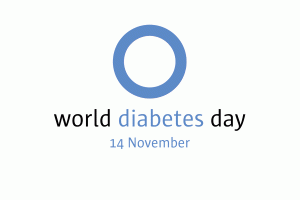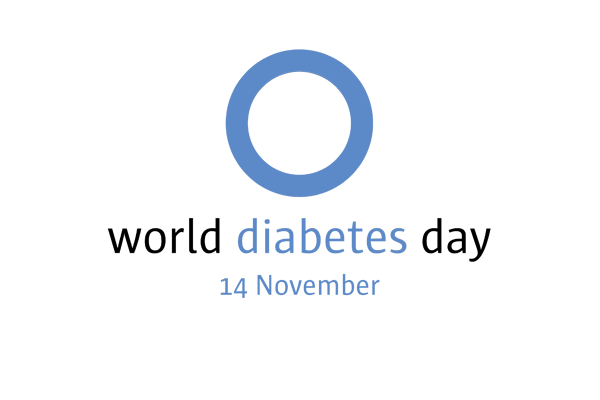In Hot Topics posts, UConn experts comment on current events and issues unfolding in the news.

Today is World Diabetes Day. It is celebrated every year on Nov. 14 to mark the birthday of Frederick Banting who, along with Charles Best, discovered insulin in 1922. This day was founded in 1991 by the International Diabetes Federation (IDF) and the World Health Organization to address the almost epidemic threat that diabetes has become.
Registered dietitian Jean Kostak is the coordinator of the Diabetes Education Program at the UConn Health Center. In light of World Diabetes Day, Kostak answered questions about the disease and why it is such a global health threat.
Q: Why do we observe World Diabetes Day?
A: The goal is to bring awareness and advocacy to the millions who suffer from diabetes around the globe. The theme of the day is the importance of education and prevention programs.

The World Diabetes Day logo is a blue circle, the global symbol for diabetes. In many cultures, the circle symbolizes life and health. The blue color represents the sky that unites all nations. Overall, the blue circle represents the unity of the global diabetes community in response to the diabetes pandemic.
November is also National Diabetes Month so in celebration of this month and World Diabetes Day, the diabetes education team at the Health Center is involved in many local events to increase awareness about diabetes.
Q: What is diabetes and why is it such a serious health problem?
A: Diabetes is a disease in which your blood glucose, or sugar, levels are too high. Glucose comes from the foods you eat. Insulin is a hormone that helps the glucose get into your cells to give them energy. With Type 1 diabetes, your body does not make insulin. With Type 2 diabetes, the more common type, your body does not make or use insulin well. Without enough insulin, the glucose stays in your blood and thwarts the body’s ability to change food into energy.
Over time, having too much glucose in your blood can cause serious problems. It can damage your eyes, kidneys, and nerves. Diabetes can also cause heart disease, stroke and even the need to remove a limb. Pregnant women can also get diabetes, called gestational diabetes.
Q: Why is the number of people being diagnosed with Type 2 diabetes increasing?
A: Age and obesity are two big risk factors for diabetes. Since the U.S. population is increasing in age and the incidence of obesity is increasing that has led to more people being diagnosed with diabetes.
People who are overweight, living a sedentary lifestyle, and over the age of 45 should consider themselves at risk for the disease. African Americans, Latinos, Native Americans, and people who have a family history of the disease are also at increased risk.
An estimated 285 million people, corresponding to 6.4 percent of the world’s adult population, are living with diabetes, according to the World Diabetes Foundation. The number is expected to grow to 438 million by 2030, corresponding to 7.8 percent of the adult population.
Q: What are the symptoms of Type 2 diabetes?
A: Symptoms may include fatigue, thirst, weight loss, blurred vision, and frequent urination. You may also notice cuts or bruises that are slow to heal, tingling or numbness in the hands and feet, and recurring skin, gum or bladder infections. But some people have no symptoms. In fact, one out of three people with Type 2 diabetes don’t know they have it. A blood test can show if you have diabetes..
Q: What happens to your body if you ignore the symptoms or don’t receive proper treatment?
A: People with diabetes are at a higher risk for heart disease, stroke, nerve damage, eye disease, and kidney disease. Getting diagnosed early in the onset of the disease and getting proper treatment reduces the risk or delays the onset of complications.
Q: What is the best way to prevent Type 2 diabetes?
A: Lifestyle changes such as weight loss if needed, and increased physical activity can help delay or prevent the onset of Type 2 diabetes.
More information can be found on the Health Center’s Diabetes Education Program website or by calling 860-679-2273.
Follow the UConn Health Center on Facebook, Twitter and YouTube.



